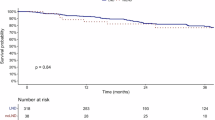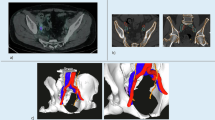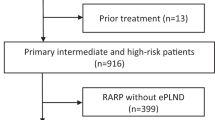Abstract
Background
Pelvic lymph node dissection (PLND) is integral to prostate cancer staging, but its therapeutic value remains debated. PSMA PET/CT has shown high accuracy in detecting lymph node metastasis (LNM). This study evaluates the feasibility of performing PLND based on PSMA PET/CT findings during robotic-assisted radical prostatectomy (RARP).
Methods
In this prospective, randomized study, biopsy-confirmed prostate cancer (PCa) patients with intermediate or high risk were enrolled. Patients with distant metastasis or prior endocrine therapy were excluded. All underwent 18F-PSMA PET/CT imaging, and those with LNM were assigned to Group A. Patients without LNM were randomized in a 1:1 ratio into Groups B and C. All patients underwent RARP and Groups A and B with PLND while Group C without. The primary outcomes were PSMA PET/CT accuracy in detecting LNM and oncological results. This trial is registered with the Chinese Clinical Trial Registry (ChiCTR2200063256).
Results
Between September 2022 and August 2023, 120 PCa patients were enrolled. The sensitivity, specificity, accuracy, positive predictive value (PPV), and NPV of PSMA PET/CT were 76.5%, 86.8%, 65.0%, 92.0%, and 84.3%. There were no significant differences in clinical parameters, progression-free survival (PFS) or PSA persistence between Groups B and C. However, PLND patients had longer surgical times, hospital stays, and higher complication rates.
Conclusions
PSMA PET/CT offers high specificity and NPV in detecting LNM.LND may be unnecessary for node-negative patients identified by PSMA PET/CT, with close follow-up recommended for those not undergoing LND.
This is a preview of subscription content, access via your institution
Access options
Subscribe to this journal
Receive 6 print issues and online access
$259.00 per year
only $43.17 per issue
Buy this article
- Purchase on SpringerLink
- Instant access to the full article PDF.
USD 39.95
Prices may be subject to local taxes which are calculated during checkout


Similar content being viewed by others
Data availability
The datasets and statistical codes generated during and/or analyzed during the current study are available from the corresponding author on reasonable request.
References
Fossati N, Willemse PPM, Van den Broeck T, van den Bergh RCN, Yuan CY, Briers E, et al. The benefits and harms of different extents of lymph node dissection during radical prostatectomy for prostate cancer: a systematic review. Eur Urol. 2017;72:84–109.
Jansen BHE, Bodar YJL, Zwezerijnen GJC, Meijer D, van der Voorn JP, Nieuwenhuijzen JA, et al. Pelvic lymph-node staging with 18F-DCFPyL PET/CT prior to extended pelvic lymph-node dissection in primary prostate cancer - the SALT trial. Eur J Nucl Med Mol Imaging. 2021;48:509–20.
Lestingi JFP, Guglielmetti GB, Trinh QD, Coelho RF, Pontes J, Bastos DA, et al. Extended versus limited pelvic lymph node dissection during radical prostatectomy for intermediate- and high-risk prostate cancer: early oncological outcomes from a randomized phase 3 trial. Eur Urol. 2021;79:595–604.
Touijer KA, Mazzola CR, Sjoberg DD, Scardino PT, Eastham JA. Long-term outcomes of patients with lymph node metastasis treated with radical prostatectomy without adjuvant androgen-deprivation therapy. Eur Urol. 2014;65:20–5.
Cai T, Nesi G, Tinacci G, Giubilei G, Gavazzi A, Mondaini N, et al. Clinical importance of lymph node density in predicting outcome of prostate cancer patients. J Surg Res. 2011;167:267–72.
Yuh B, Artibani W, Heidenreich A, Kimm S, Menon M, Novara G, et al. The role of robot-assisted radical prostatectomy and pelvic lymph node dissection in the management of high-risk prostate cancer: a systematic review. Eur Urol. 2014;65:918–27.
Li EV, Schaeffer EM, Ramesh Kumar SKS, Zhou R, Yang XJ, Mana-Ay M, et al. Utility of 18F-DCFPyL PET for local staging for high or very high risk prostate cancer for patients undergoing radical prostatectomy. Eur J Nucl Med Mol Imaging. 2025;52:2335–42.
Bodar YJL, Jansen BHE, van der Voorn JP, Zwezerijnen GJC, Meijer D, Nieuwenhuijzen JA, et al. Detection of prostate cancer with 18F-DCFPyL PET/CT compared to final histopathology of radical prostatectomy specimens: is PSMA-targeted biopsy feasible? The DeTeCT trial. World J Urol. 2021;39:2439–46.
Initial multicentre experience of 68 gallium-PSMA PET/CT guided robot-assisted salvage lymphadenectomy: acceptable safety profile but oncological benefit appears limited - PubMed [Internet]. [2025]. https://pubmed.ncbi.nlm.nih.gov/28548372/
van Leeuwen PJ, Donswijk M, Nandurkar R, Stricker P, Ho B, Heijmink S, et al. Gallium-68-prostate-specific membrane antigen (68 Ga-PSMA) positron emission tomography (PET)/computed tomography (CT) predicts complete biochemical response from radical prostatectomy and lymph node dissection in intermediate- and high-risk prostate cancer. BJU Int. 2019;124:62–8.
Pienta KJ, Gorin MA, Rowe SP, Carroll PR, Pouliot F, Probst S, et al. A phase 2/3 prospective multicenter study of the diagnostic accuracy of prostate specific membrane antigen PET/CT with 18F-DCFPyL in prostate cancer patients (OSPREY). J Urol. 2021;206:52–61.
Hope TA, Eiber M, Armstrong WR, Juarez R, Murthy V, Lawhn-Heath C, et al. Diagnostic accuracy of 68Ga-PSMA-11 PET for pelvic nodal metastasis detection prior to radical prostatectomy and pelvic lymph node dissection: a multicenter prospective phase 3 imaging trial. JAMA Oncol. 2021;7:1635–42.
Krohn T, Verburg FA, Pufe T, Neuhuber W, Vogg A, Heinzel A, et al. [(68)Ga]PSMA-HBED uptake mimicking lymph node metastasis in coeliac ganglia: an important pitfall in clinical practice. Eur J Nucl Med Mol Imaging. 2015;42:210–4.
Iravani A, Hofman MS, Mulcahy T, Williams S, Murphy D, Parameswaran BK, et al. 68Ga PSMA-11 PET with CT urography protocol in the initial staging and biochemical relapse of prostate cancer. Cancer Imaging. 2017;17:31.
Kroenke M, Mirzoyan L, Horn T, Peeken JC, Wurzer A, Wester HJ, et al. Matched-pair comparison of 68Ga-PSMA-11 and 18F-rhPSMA-7 PET/CT in patients with primary and biochemical recurrence of prostate cancer: frequency of non-tumor-related uptake and tumor positivity. J Nucl Med. 2021;62:1082–8.
Giesel FL, Hadaschik B, Cardinale J, Radtke J, Vinsensia M, Lehnert W, et al. F-18 labelled PSMA-1007: biodistribution, radiation dosimetry and histopathological validation of tumor lesions in prostate cancer patients. Eur J Nucl Med Mol Imaging. 2017;44:678–88.
Afshar-Oromieh A, Debus N, Uhrig M, Hope TA, Evans MJ, Holland-Letz T, et al. Impact of long-term androgen deprivation therapy on PSMA ligand PET/CT in patients with castration-sensitive prostate cancer. Eur J Nucl Med Mol Imaging. 2018;45:2045–54.
Stabile A, Pellegrino A, Mazzone E, Cannoletta D, de Angelis M, Barletta F, et al. Can negative prostate-specific membrane antigen positron emission tomography/computed tomography avoid the need for pelvic lymph node dissection in newly diagnosed prostate cancer patients? A systematic review and meta-analysis with backup histology as reference standard. Eur Urol Oncol. 2022;5:1–17.
Yaxley JW, Raveenthiran S, Nouhaud FX, Samaratunga H, Yaxley WJ, Coughlin G, et al. Risk of metastatic disease on 68 gallium-prostate-specific membrane antigen positron emission tomography/computed tomography scan for primary staging of 1253 men at the diagnosis of prostate cancer. BJU Int. 2019;124:401–7.
Gandaglia G, Mazzone E, Stabile A, Pellegrino A, Cucchiara V, Barletta F, et al. Prostate-specific membrane antigen radioguided surgery to detect nodal metastases in primary prostate cancer patients undergoing robot-assisted radical prostatectomy and extended pelvic lymph node dissection: results of a planned interim analysis of a prospective phase 2 study. Eur Urol. 2022;82:411–8.
Schilham MGM, Somford DM, Küsters-Vandevelde HVN, Hermsen R, van Basten JPA, Hoekstra RJ, et al. Prostate-specific membrane antigen-targeted radioguided pelvic lymph node dissection in newly diagnosed prostate cancer patients with a suspicion of locoregional lymph node metastases: the DETECT trial. J Nucl Med. 2024;65:423–9.
Joniau SG, Van Baelen AA, Hsu CY, Van Poppel HP. Complications and functional results of surgery for locally advanced prostate cancer. Adv Urol. 2012;2012:706309.
Meijer D, Ettema RH, van Leeuwen PJ, van der Kwast TH, van der Poel HG, Donswijk ML, et al. The prognostic value of lymph node staging with prostate-specific membrane antigen (PSMA) positron emission tomography/computed tomography (PET/CT) and extended pelvic lymph node dissection in node-positive patients with prostate cancer. BJU Int. 2023;131:330–8.
Kimura S, Urabe F, Sasaki H, Kimura T, Miki K, Egawa S. Prognostic significance of prostate-specific antigen persistence after radical prostatectomy: a systematic review and meta-analysis. Cancers. 2021;13:948.
Acknowledgements
We thank the staff at the Statistical Office of the First Medical Center, PLA General Hospital, for their assistance, as well as the Nuclear Medicine Department for their support in imaging. Our heartfelt thanks also go to all colleagues, friends, family members, and the reviewers and editors for their valuable feedback and support throughout this study.
Funding
This study was supported by National Key R&D Program of China (2023YFC3606000) and National Natural Science Foundation of China (82372704).
Author information
Authors and Affiliations
Contributions
ZJ, QL, and KL designed experiments and helped write the manuscript. YJ, ZC, and ZL acquired the data. JL, JL, and SD analyzed and interpreted the data. YL and SN performed the critical revision of the manuscript for important intellectual content. WB obtained funding and supervised the research. YL, SN, WC, and XZ provided administrative, technical, or material support.
Corresponding authors
Ethics declarations
Competing interests
None of the contributing authors have any conflicts of interest, including specific financial interests and relationships and affiliations relevant to the subject matter or materials discussed in the manuscript.
Ethics approval and consent to participate
The study protocol was conducted in accordance with the Declaration of Helsinki and Good Clinical Practice guidelines. All patients provided written informed consent prior to their participation in the study. The trial was approved by the Institutional Ethics Board of PLA General Hospital, and the protocol was reviewed by the Scientific Committee of the Chinese Clinical Trial Registry (ChiCTR2200063256).
Additional information
Publisher’s note Springer Nature remains neutral with regard to jurisdictional claims in published maps and institutional affiliations.
Supplementary information
Rights and permissions
Springer Nature or its licensor (e.g. a society or other partner) holds exclusive rights to this article under a publishing agreement with the author(s) or other rightsholder(s); author self-archiving of the accepted manuscript version of this article is solely governed by the terms of such publishing agreement and applicable law.
About this article
Cite this article
Jia, Z., Liu, Q., Liu, K. et al. Lymph node dissection based on 18F-PSMA PET/CT during radical prostatectomy for intermediate and high risk prostate cancer: interim results of a prospective, randomized study. Prostate Cancer Prostatic Dis (2025). https://doi.org/10.1038/s41391-025-01029-9
Received:
Revised:
Accepted:
Published:
Version of record:
DOI: https://doi.org/10.1038/s41391-025-01029-9



